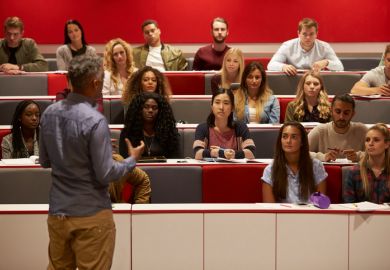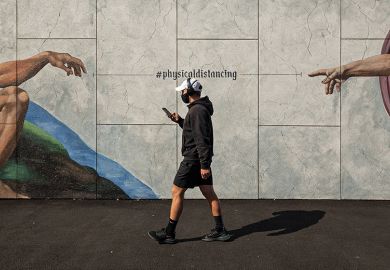In March 1872, Friedrich Nietzsche spoke out against the lecture. Students are connected to the university through the ear, he said. Though he quipped that they might not actually listen. Higher education comprised then, as it does now, mostly lectures and some seminars. And at first glance, Nietzsche’s misgivings about our main didactic method mirror those expressed in THE last week.
The lecture is what contemporary German would call “frontal”, with a lecturer standing and talking at the front of the room − and so students sit passively in their seats. By implication, the lecture is inefficient and doesn’t offer a meaningful connection. Nietzsche considered the moment an auditor writes something down to be the point when they are attached to the university – by an umbilical cord. In her piece last week, Simone Buitendijk also described learning and teaching in terms of parental metaphors. To lecture is to scold or give unwanted advice, or is at least an uninspiring interaction.
The lecture is dead, long live the lecture: Redefining higher education in a digital age
But this understanding of the lecture is reductive, however rhetorically powerful. In antiquity as in the modern period, lectures were spontaneous, or appeared to be so. (The lecturer, like the actor, sometimes memorises scripts and makes them look like natural turns of thought.) The lecture is performance, plays to the affects and displays the embodiment of knowledge − as well as transferring information or inspiring.
I not only remember the eccentricities of certain lecturers I had as an undergraduate; the anecdotes were the reason I got out of bed for 9am, and ideas and facts stuck to them. Discussion of German dialectology on my year abroad will forever be associated with a lecturer’s Belle Époque fashion and a certain perfume I’ve never smelled anywhere else. The lecture may not be a conversation exactly, but it is still conscious of its audience. And it’s certainly as personal as it is professional.
Research in German studies is relevant for today’s debates. It has shown how lectures in earlier periods contributed to the success of the university in times of transition. My colleague Sean Franzel has argued at length in his excellent book Connected by the Ear that the German Romantics conceived the lecture as a dialogic form amid a new multimedia age and in opposition to outdated scholasticism.
It’s also the case that German universities, which had been fairly provincial, rose to prominence towards the end of the 18th century. The institutional shift was not so much thanks to the likes of Kant, who lectured for more than 20 hours a week, but more due to the increase in extraordinary (that is, adjunct) professors who lived from their lecturing fees.
Often authors or thinkers with an emergent reputation in the public sphere, these men (and they were men) were good for student numbers, attracting large crowds that paid by the hour. Some of these lecturers went on to take up regular professorial chairs, such as at the newly formed University of Berlin in 1810.
In giving these examples, I don’t want to extol a specific sort of lecturing, or consumerism in education for that matter. The point is that we cannot define the lecture in a stable way − despite its longevity. The form has always adapted.
The paradox of Nietzsche’s stance is that he objected to lectures while in a lecture: standing at a lectern at Basel city museum, as professor of classical philology. Lectures have long been an opportunity to criticise the very ways in which we impart knowledge.
In a programme for Radio 3, Mary Beard chose Plutarch’s “On listening to lectures” as a classical example. I opted for my favourite German Romantic, Jean Paul Richter. He portrays the German professor as a straw man of stiff and well-worn delivery and the foil for his own witty, original approach. What is different about today’s critique, though, is that it portrays the lecture rigidly in order to abolish it.
From lecture theatre to living room: adapting teaching techniques to the online classroom
An end to lectures entirely would be an intellectual loss. Yet as universities adopt institution-wide learning and teaching strategies that look past Covid, their absence from timetables is a real possibility.
There is a second difference between Nietzsche and today’s critics of lectures. Nietzsche saw the lecture as part and parcel of utilitarian, bureaucratic machinery. He had an elitist view of education that, for him, was hindered by rationalist society. Current colleagues calling for a rethink of lectures, meanwhile, argue that they’re inadequate precisely because they do not prepare students enough for working and civic life. I agree with that realistic aim. However, it seems to me that students have access to more explanatory content on the internet, and more research findings at their fingertips, than ever before.
In spite and sometimes because of such information overload, there’s an urgent need for narrative, for interpretation and for an informed, necessarily personal perspective that’s in turn open to criticism. To my mind, working in the humanities, we could take that as the broad definition of a good lecture. And a reason not to remove the form wholesale to make more room for flipped learning, punchy videos or group-work exercises.
At a time when online journalism is turning to long-form writing, it would be ironic if in universities we cut our lectures short.
Seán Williams is senior lecturer in German and European cultural history in the School of Languages and Cultures at the University of Sheffield. What Makes a Good Lecture? is available on BBC Sounds and as a Radio 3 Arts and Ideas podcast.
Register to continue
Why register?
- Registration is free and only takes a moment
- Once registered, you can read 3 articles a month
- Sign up for our newsletter
Subscribe
Or subscribe for unlimited access to:
- Unlimited access to news, views, insights & reviews
- Digital editions
- Digital access to THE’s university and college rankings analysis
Already registered or a current subscriber?





